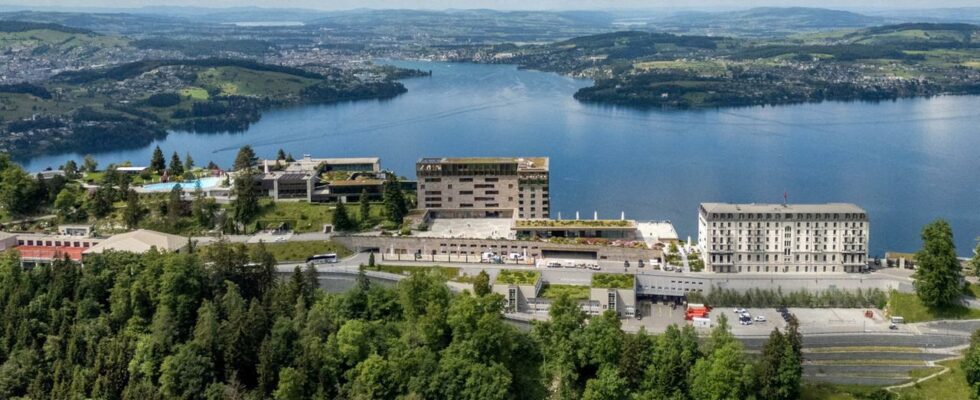europemagazine
Since the Russian attack on Ukraine, Switzerland has been struggling with its role as a neutral country. It does not provide military aid, but is now organizing an international summit meeting that is intended to create a “zero hour” for peace. Is that feasible?
It is certainly not the setting that is to blame for the rather modest prospects of success of this Ukraine peace conference. The conference venue, the luxury resort Bürgenstock on Lake Lucerne, is perched on a lush green mountain ridge in the middle of the picturesque landscape of the canton of Nidwalden. Diplomatic conferences have a tradition here. In 2002, a ceasefire agreement for Sudan was negotiated on the Bürgenstock. In 2004, efforts were made in vain to find a solution to the Cyprus conflict in the Swiss mountain idyll.
One thing is already clear: this weekend’s meeting will not be a “peace conference”. The aggressor Russia is not present and is showing no credible willingness to end its war against Ukraine. Switzerland did not even invite the country. “If we had invited Russia, we could have lost Ukraine,” says Swiss Foreign Minister Ignazio Cassis.
“It might also have been wise to simply invite Russia,” says Thomas Greminger, director of the Geneva Centre for Security Policy and former Secretary General of the Organisation for Security and Co-operation in Europe (OSCE). “Then the responsibility would not now be with Switzerland.”
What is now required is “creativity”, says Foreign Minister Cassis, “to seek different ways with the support of many powerful countries in the world”.
“Starting a process”
Representatives of at least 90 states and organizations have confirmed their participation. Heads of state or government from about half of the countries will be attending, including German Chancellor Olaf Scholz, French President Emmanuel Macron and, of course, Ukrainian President Volodymyr Zelensky.
However, some important, powerful countries will be missing – namely those that are close to Russia, especially China and Brazil. After a meeting between Swiss President Viola Amherd and Brazilian President Lula da Silva in Geneva on Thursday, all that was said was that they had spoken about the “different perspectives” on “how the path to peace in Ukraine can be taken”.
Expectations ahead of the summit in Switzerland are correspondingly subdued. Foreign Minister Cassis says he would be happy if this conference succeeds in “launching a process”. In other words: the journey is the destination.
Hardly any financial aid for Ukraine
Switzerland is likely to see its role as host of this – as it is officially called – “Conference on Peace in Ukraine” as an opportunity to cultivate its own foreign policy image. After all, Switzerland has been the target of much criticism since the start of the major Russian attack on Ukraine almost two and a half years ago. Citing the country’s neutrality and the strict War Material Act, the government in Bern prohibits friendly countries such as Germany from passing on weapons and ammunition produced in Switzerland to Ukraine.
Overall, rich Switzerland is also far behind in international comparison when it comes to aid to Ukraine, namely – measured by economic output – in 34th place out of 41 countries, according to the “Ukraine Support Tracker” of the Kiel Institute for the World Economy.
“Money is by no means everything,” says Foreign Minister Cassis in response to this criticism. With regard to the Ukraine reconstruction conference that just ended in Berlin, he recalls that the first of these conferences took place in Lugano in 2022 on the initiative of Switzerland. “We are proud of that,” says Cassis. With the peace conference, they are now trying to “spur something on, admittedly in a much more difficult context.”
Search for the minimal consensus
With peace as a long-term goal, Switzerland has set three thematic priorities for the Bürgenstock meeting: nuclear safety, food safety and humanitarian issues. “These issues are not relevant to conflict resolution in the narrow sense,” says security policy expert Greminger. But they are “issues that do not polarize.” A minimal consensus, then.
The Swiss government hopes that the conference at the weekend will be what Foreign Minister Cassis calls a “zero hour” of the peace process. Little more than well-meaning declarations of intent can be expected. Negotiations and wrangling over an official joint final declaration by the summit participants have been going on for weeks. Every day is “one step forward and two back, or two forward and one back,” Cassis said last Monday in Bern.
For Geneva security policy expert and diplomat Thomas Greminger, the Bürgenstock meeting would be a success, he says, “if we have some clarity on Sunday evening about how things should proceed.” At the very least, the conference would allow “Ukraine to be brought back onto the political radar and all ideas about how a peace process should be structured to be expressed.”
You can see a report on the topic and other articles in the Europamagazin – on Sunday, 16.6.2024 at 12:45 on Das Erste

